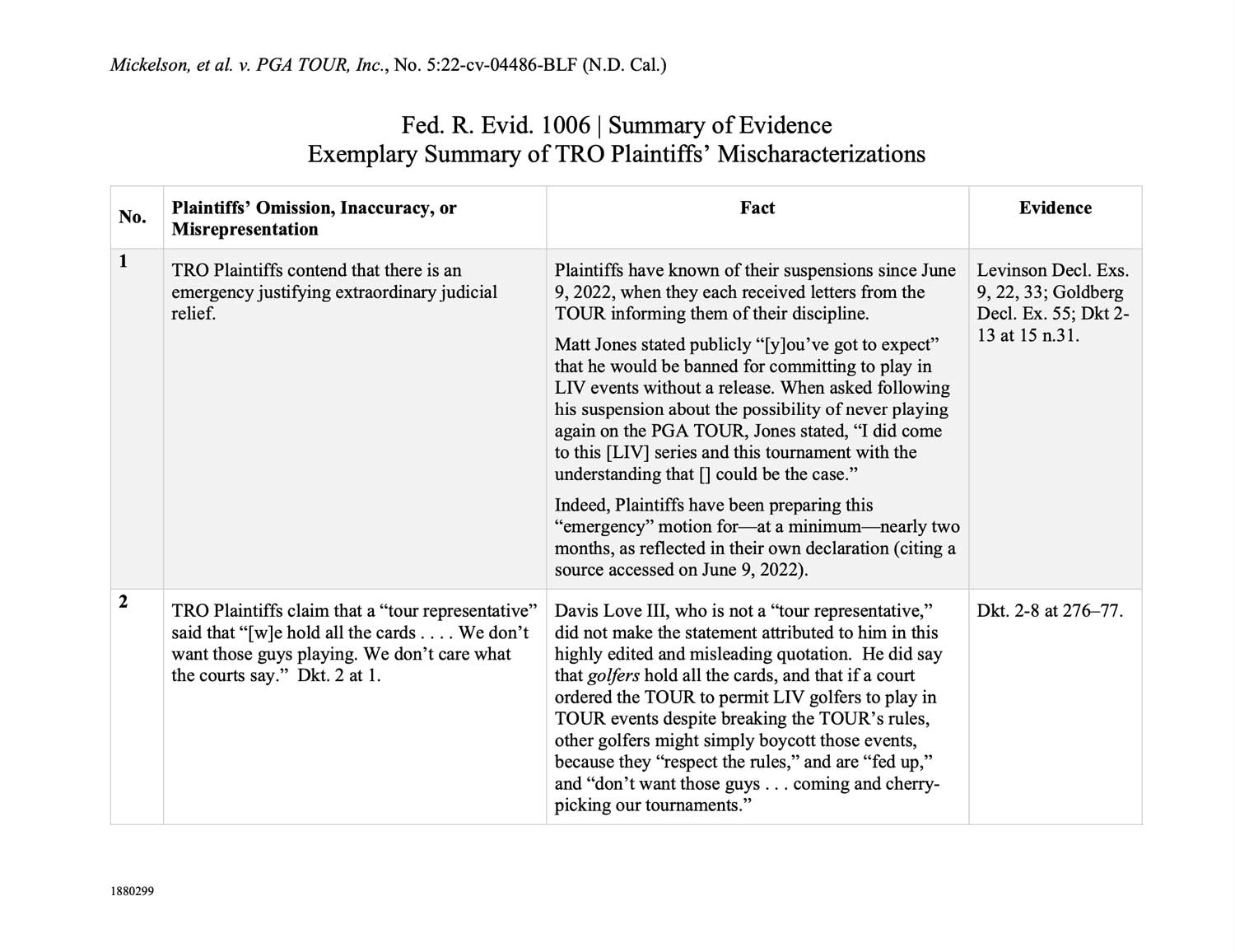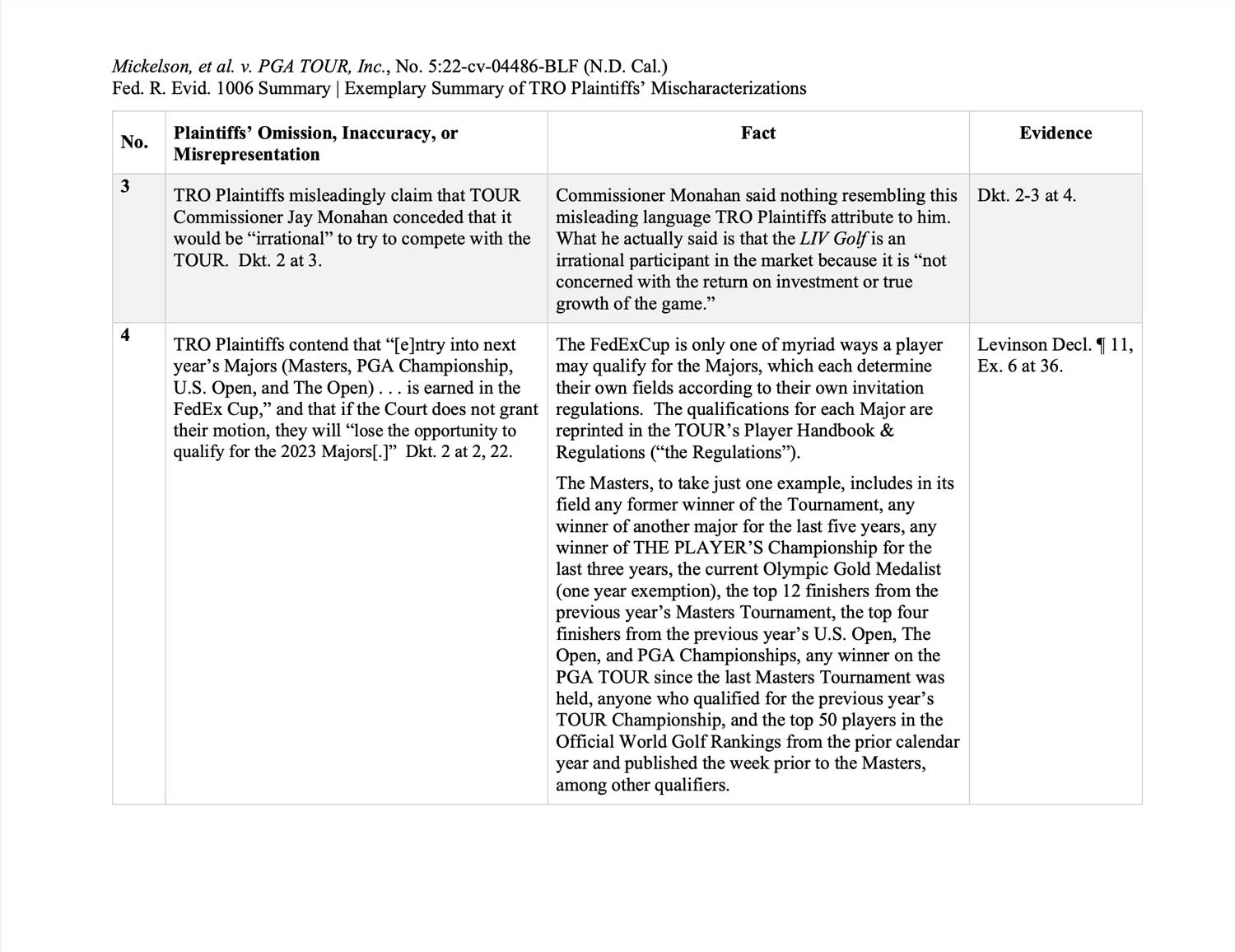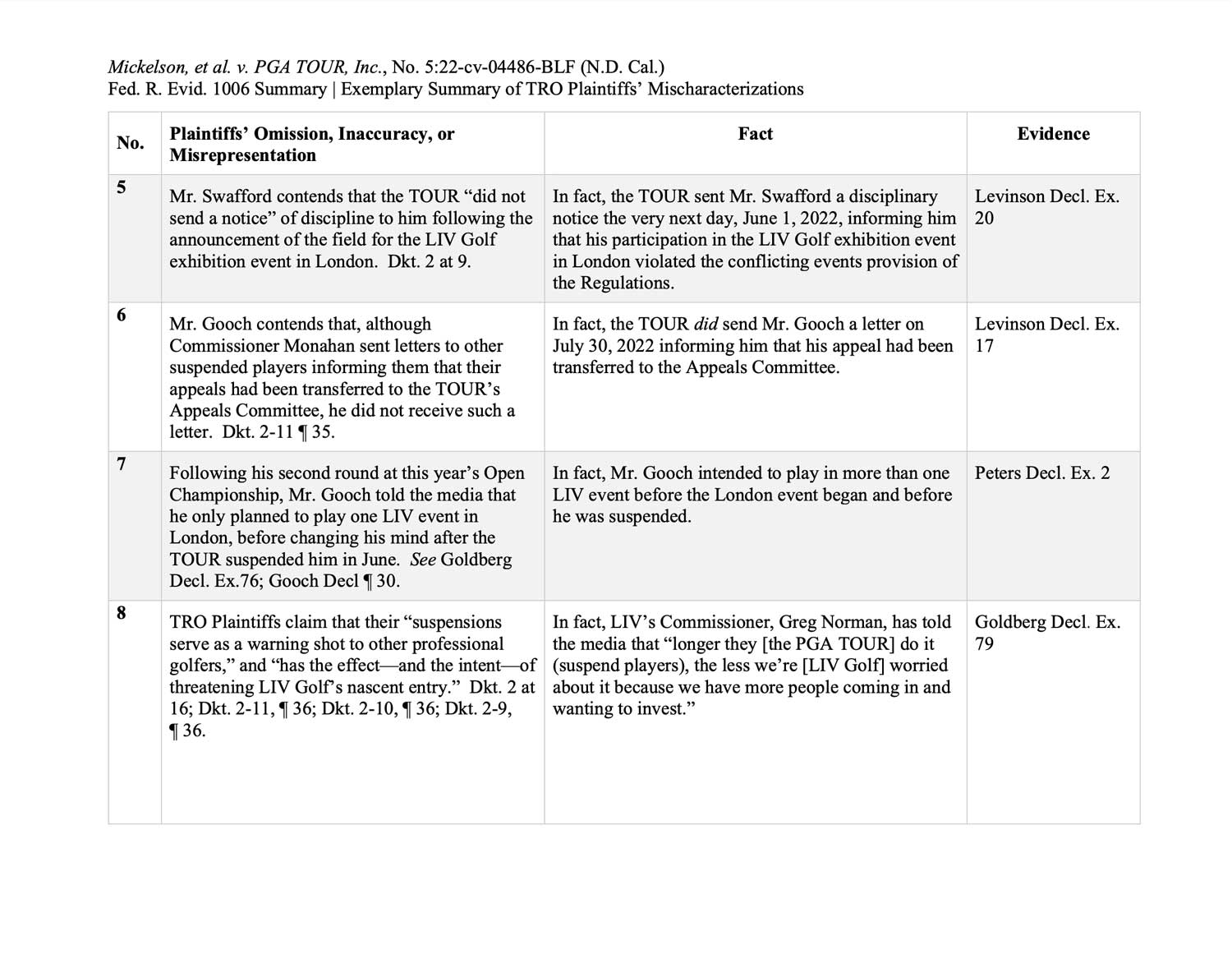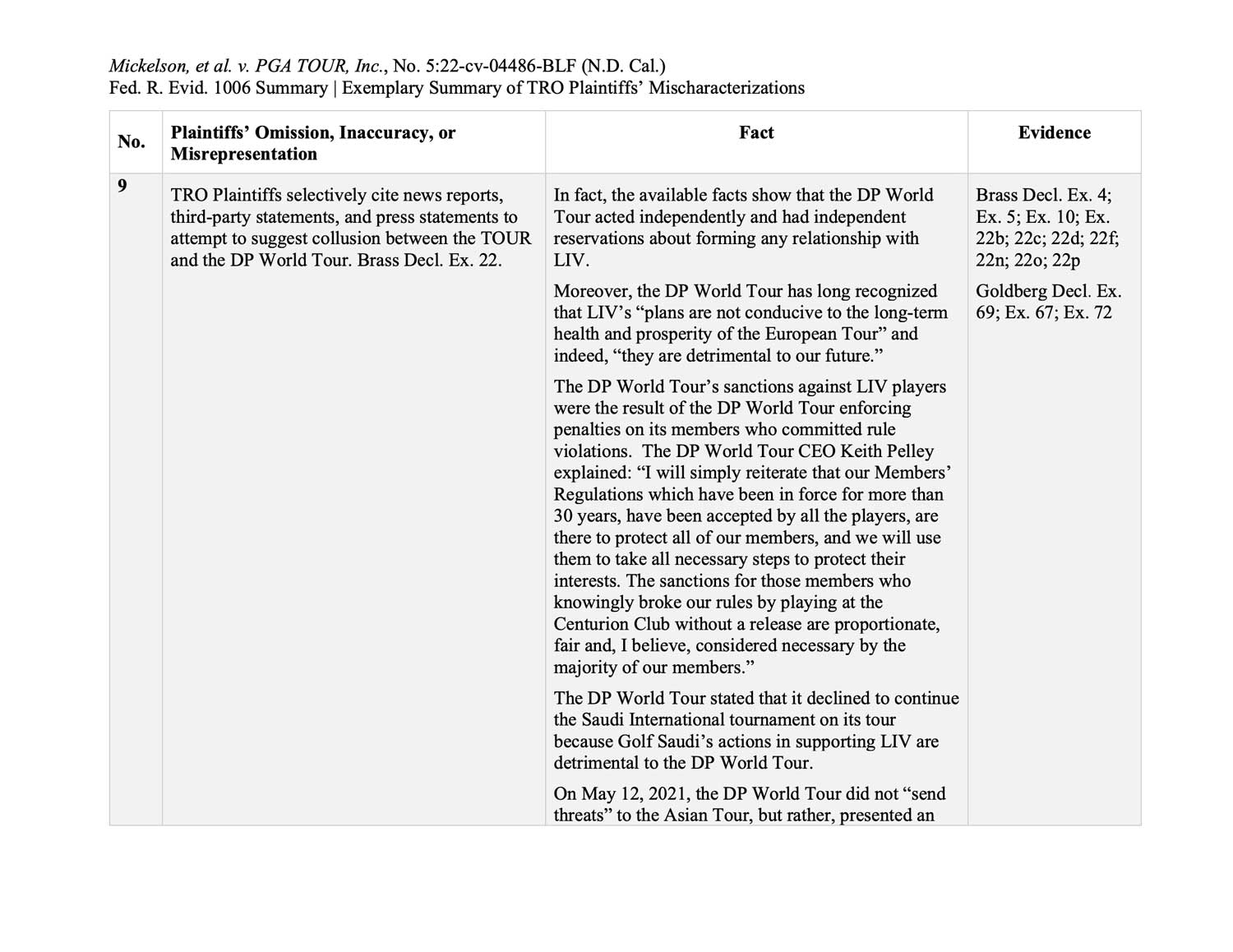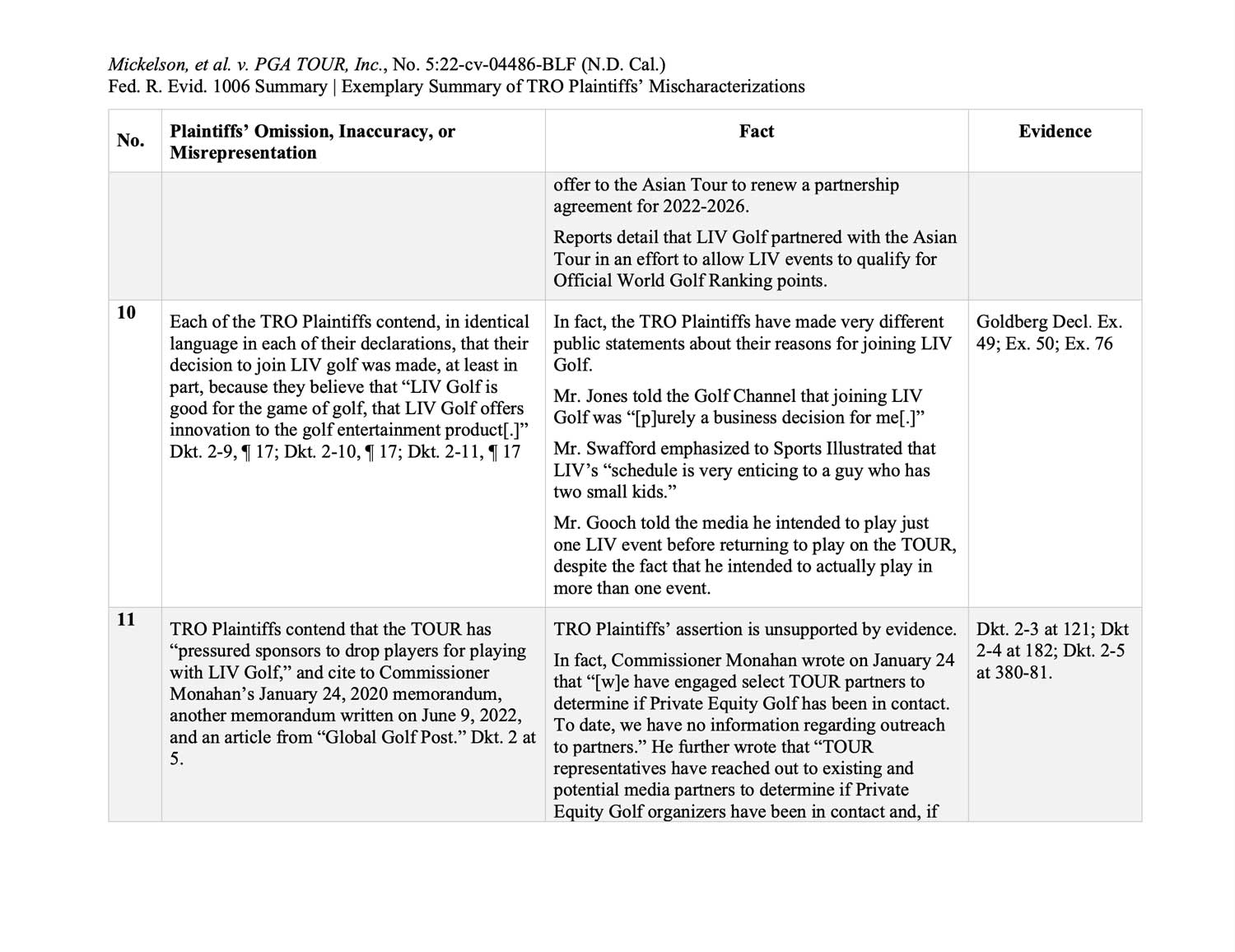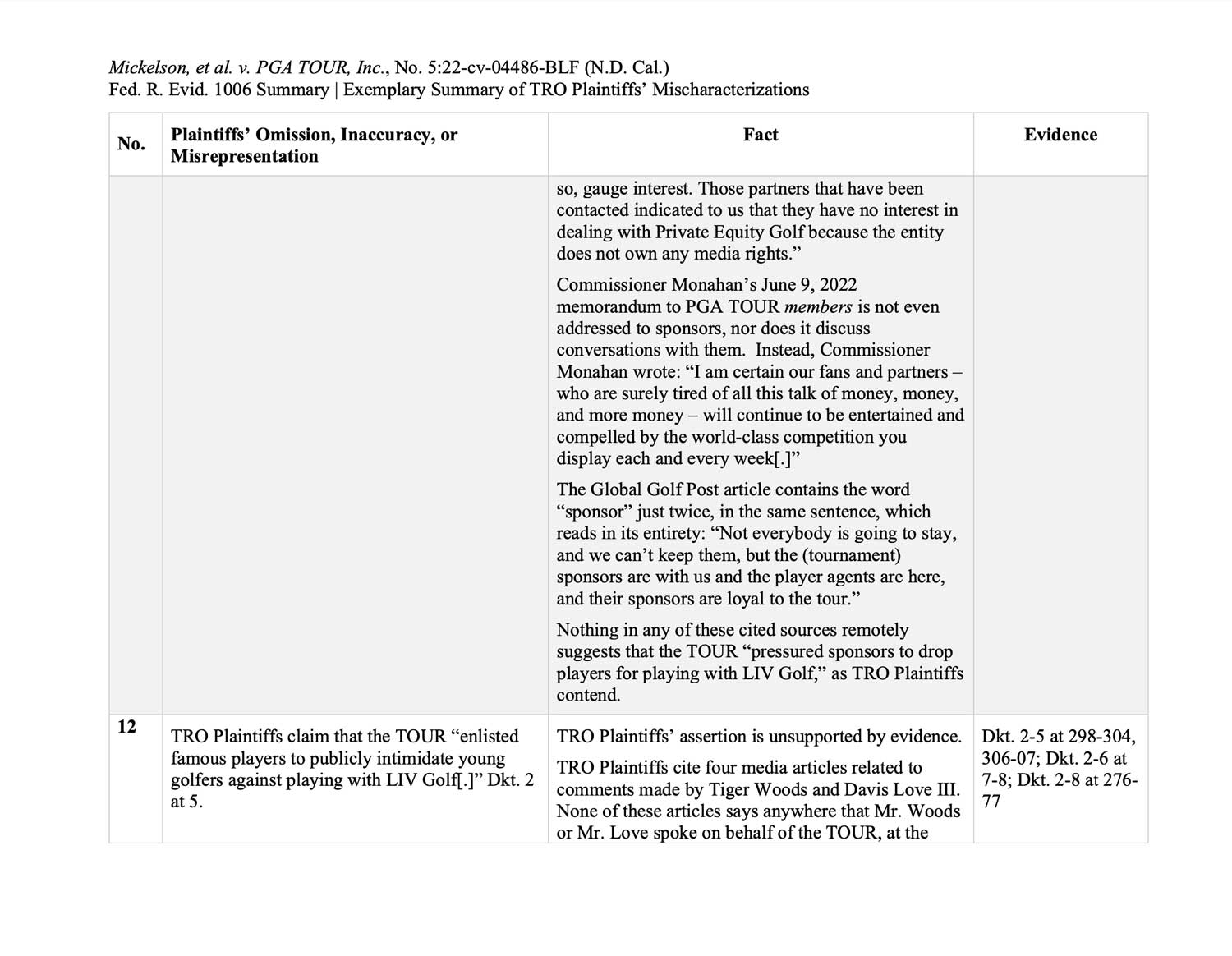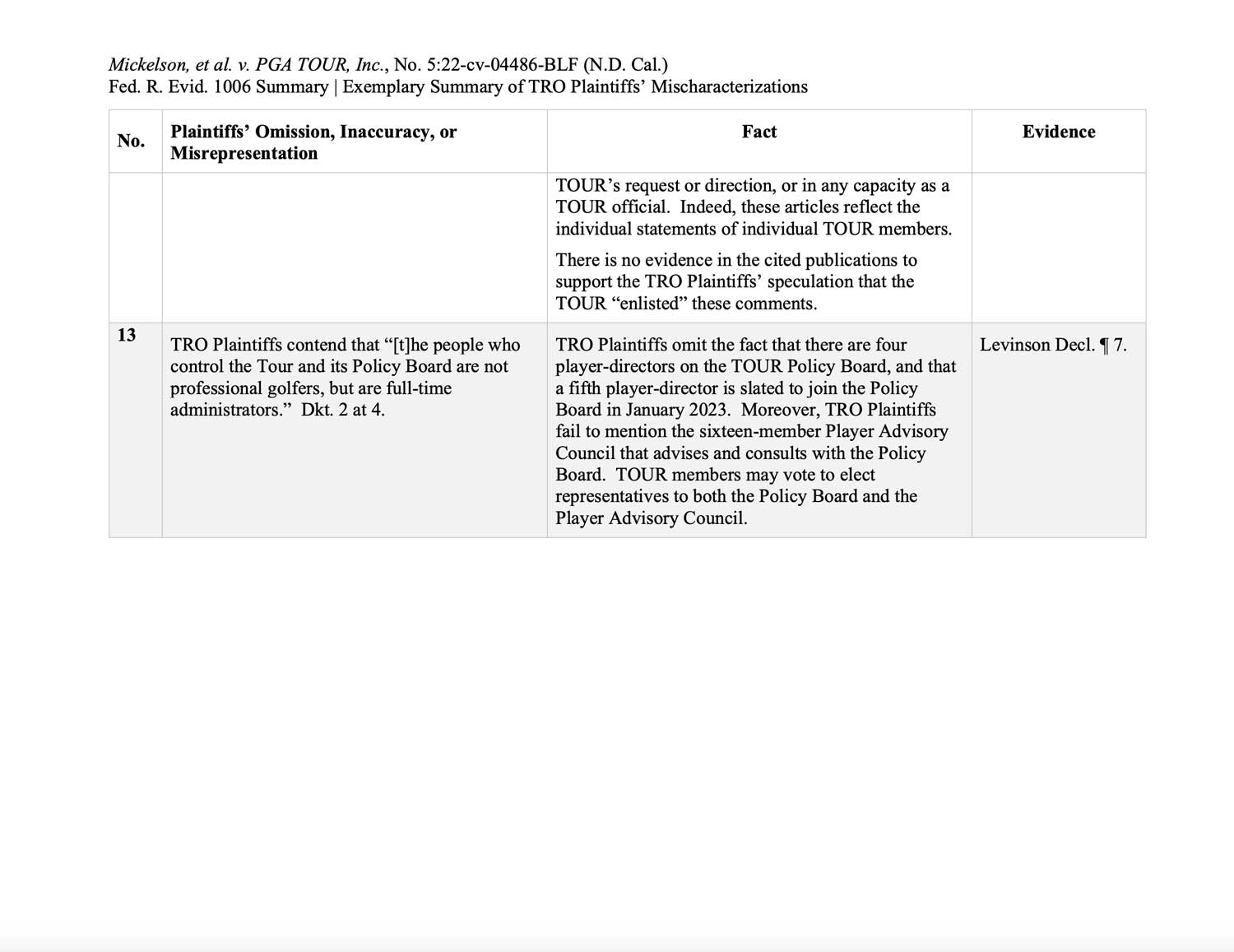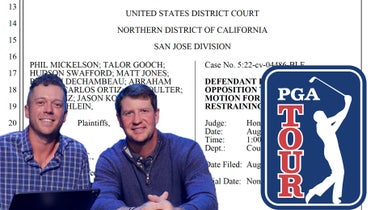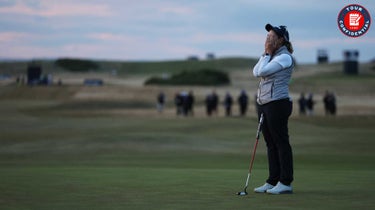Tiger Woods finished his first round at the Masters on Friday morning, carding a 1-over 73 that put him 8 shots behind leader Bryson DeChambeau.
PGA Tour fires back with 13 ‘mischaracterizations’ LIV pros made in lawsuit


PGA Tour commmissioner Jay Monahan.
getty images
Last week, LIV’s players — and its legal team — had their say. On Monday, it was time for the PGA Tour — and its own legal team — to fire back.
The Tour’s legal eagles filed their response on Monday morning to Temporary Restraining Order (TRO) plaintiffs Talor Gooch, Hudson Swafford and Matt Jones, each of whom was suspended from the PGA Tour and is seeking to play in this week’s FedEx Cup Playoff event in Memphis.
The Tour’s lead counsel in the dispute, Elliot Peters of Keker, Van Nest & Peters, disputed the players’ claims, calling their purported harm “entirely self-induced” and adding that the Tour will litigate “vigorously” to protect its reputation and benefits.
My colleague Sean Zak pored over the entire filing to give you these key takeaways. But for our purposes here, let’s focus on the “exemplary chart” that was filed as a supplement to the Tour’s opposition. The purpose of the chart was to specifically address what the Tour alleges were “mischaracterizations” in the LIV players’ initial filing. (You can also ignore my interpretations, scroll to the bottom of this article and read the chart yourself.)
“Unable to establish their claims based on any fair interpretation of admissible evidence, TRO Plaintiffs have resorted to mischaracterizing the record,” a Tour representative wrote via email. “The mischaracterizations, half-truths, and falsehoods are so numerous in Plaintiffs’ brief that the TOUR couldn’t respond to all of them and instead had to create a separate chart identifying an exemplary set.”
That “exemplary set” is a list that runs 13 claims deep and can help crystallize the grounds on which the Tour is contesting the LIV players’ case. In other words, the Tour says these are 13 examples of things that LIV claimed that aren’t quite true — though it’s not saying these were the only 13 things. So let’s get to the Tour’s claims, in as plain English as possible.
(Please note that these are the Tour’s claims rather than my own.)
PGA Tour Claim 1: There is no “emergency”
According to the Tour, there is no emergency justifying extraordinary judicial relief, as would be required for a TRO of this expedited nature. The Tour argues that the pros involved have known of their suspensions since June 9, when they teed it up at the first LIV event in London and were notified as such. (More on that later.)
The Tour included a quote from Jones: “I did come to this series and this tournament with the understanding that could be the case,” he said in London. So what’s the Tour’s point? Essentially that the pros were aware they’d be suspended and would have had plenty of time to file a suit earlier — but instead prepared their emergency motion for nearly two months or more.
Claim 2: Davis Love III is not a “tour representative” and was taken out of context
The LIV pros’ suit referred to Davis Love III as a “tour representative” and, the Tour argues, used a “highly edited and misleading quotation.”
That quotation?
“[w]e hold all the cards . . . . We don’t want those guys playing. We don’t care what the courts say.”
There’s more context, the Tour says, including the following:
“He did say that golfers hold all the cards, and that if a court ordered the TOUR to permit LIV golfers to play in TOUR events despite breaking the TOUR’s rules, other golfers might simply boycott those events, because they ‘respect the rules,’ and are ‘fed up,’ and ‘don’t want those guys . . . coming and cherry-picking our tournaments.’”
As to the question of whether Love is a Tour representative? He is the captain of the U.S. Presidents Cup team, and the Presidents Cup is owned and run by the PGA Tour, which gives him close ties with Tour officials. But he isn’t technically a representative himself.
Claim 3: Jay Monahan didn’t say it would be ‘irrational’ to compete with the PGA Tour
The Tour says that LIV quoted PGA Tour commissioner Jay Monahan as saying it would be “irrational” to try to compete with the Tour. In fact, the Tour says, Monahan said “nothing resembling this misleading language,” and that Monahan actually just referred to LIV as an “irrational participant in the market” because it does not need to get a return on its investment. This leans into the Tour’s portrayal of LIV as a Saudi sportswashing enterprise with endless money rather than a more traditional “rational” competitor.
Claim 4: Entry to golf’s majors is not earned only through the FedEx Cup
The Tour takes issue with LIV’s suggestion that the plaintiffs would “lose the opportunity to qualify for the 2023 Majors.” In its response, the Tour outlines that the FedEx Cup is “only one of myriad ways” that a pro can qualify for major championships. The Tour then goes on to list the specifics for the Masters, whose field includes:
-former Masters winners
-major champions from the last five years
-Players Champions from the last three years
-an Olympic Gold Medalist from the last 12 months
-the top 12 finishers from last year’s Masters
-the top four finishers from the other three majors
-PGA Tour winners since the last Masters
-anyone who qualified for the Tour Championship
-the top 50 players in the world ranking from the prior calendar year as well as the week before the Masters
In other words, there are quite a few other ways that don’t involve playing the FedEx Cup finals — although being a regular participant on the PGA Tour is certainly helpful in earning your way through several of those categories.
5. Hudson Swafford was sent a disciplinary notice about LIV, despite his claims
Swafford claims the Tour “did not send a notice” describing disciplinary action after he was announced as part of the field for LIV’s London event. The Tour counters that it did send Swafford a disciplinary notice the day after the field release, June 1, 2022. In that notice, the Tour informed him he would violate its rules by participating.
There is some room between Swafford being sent a notice and him actually receiving it. More on that in a moment.
Claim 6: Despite his claims, Talor Gooch was sent a letter about his appeal going to the Tour’s appeals committee
Gooch says he didn’t receive a letter about his appeal being transferred to the Tour’s Appeals Committee, even though other players received them. The Tour is pretty clear in its response:
“In fact, the TOUR did send Mr. Gooch a letter on July 30, 2022 informing him that his appeal had been transferred to the Appeals Committee.”
Again, there’s some room between Gooch not receiving a letter and it being sent. It’s not clear if there is evidence that Gooch received the letter or not.
Claim 7: Gooch wasn’t truthful with the media about his LIV intentions
Gooch told members of the media (this writer included) that he intended to only play a single LIV event and didn’t think he’d be suspended if he did. He also told certain Tour officials he intended to play just the London event. The Tour disputes that:
“In fact, Mr. Gooch intended to play in more than one LIV event before the London event began and before he was suspended,” the Tour writes. There seems to be more to the story; it seems likely the Tour knows something it believes indicates that Gooch’s intentions went beyond just the first event. But we don’t know yet what that evidence is.
Claim 8: PGA Tour suspensions don’t actually threaten LIV’s future
Part of the LIV golfers’ antitrust case has to do with the PGA Tour squashing competition. But the Tour argues that despite their claims that suspensions are a warning to other pros and have “the effect — and the intent — of threatening LIV Golf’s nascent entry,” Norman has actually crowed about the suspensions.
Norman’s words, per the Tour: “[The] longer they [the PGA TOUR] do it, the less we’re worried about it because we have more people coming in and wanting to invest.”
There’s more to it than that, of course — Tour suspensions would be a factor for any pro considering playing a LIV event. But most pros have gone in clear-headed.
Claim 9: The suit provides no evidence of collusion between the DP World Tour and the PGA Tour
This is one of the longer claims from the chart; it essentially boils down to the Tour’s assertion that LIV “selectively” cited news reports, third-party statements and press statements to suggest collusion. The truth, the Tour says, is that the available facts actually demonstrate DP World Tour CEO Keith Pelley sanctioned players on his tour because they’d violated its regulations, not because of pressure or agreement from the PGA Tour.
Claim 10: Gooch, Jones and Swafford have made contradictory statements as to why they joined LIV
In the LIV filing, Gooch, Jones and Swafford each used identical language in describing their reasons for joining LIV, including their belief that “LIV Golf is good for the game of golf, that LIV Golf offers innovation to the golf entertainment product[.]”
The Tour points out that they made other assertions about their reasoning. Jones told Golf Channel that joining LIV was “purely a business decision for me” while Swafford told Sports Illustrated that LIV’s schedule was “very enticing to a guy who has two small kids” and Gooch, as previously mentioned, told the media he was intending to play only one event. (That last bit is murky because the Tour has called out those media claims as being untrue, but the general point is that his statements are inconsistent.)
Claim 11: There’s no evidence the PGA Tour has pressured sponsors to drop LIV golfers
Despite LIV players’ claims that the Tour has “pressured sponsors to drop players for playing with LIV Golf,” the Tour says that the evidence cited is insufficient. One memo from 2020 included Monahan asking about Private Equity Golf (a former iteration of LIV) and its contact with media partners. The Tour claims the other cited memo, from June 9, 2022, was not addressed to sponsors and didn’t discuss conversations with partners. Instead a Global Golf Post article about the story quoted Monahan as suggesting the sponsors were loyal but didn’t suggest he had pressured them.
Claim 12: The PGA Tour didn’t make its famous pros intimidate potential LIV signees
LIV’s suit claimed the Tour had “enlisted famous players to publicly intimidate young golfers” who were considering making the jump. The Tour says that isn’t supported by evidence and that the articles in question cited statements from individuals, Tiger Woods and Davis Love III, who were acting on their own and not speaking on behalf of the Tour.
Claim 13: The LIV suit ignores players on the PGA Tour Policy Board
Despite LIV’s claims that those who control the Tour and its policy board “are not professional golfers, but are full-time administrators,” the Tour wants to make it clear that there are four player-directors on the Tour Policy Board, with a fifth on the way. The Tour points out that the 16-member Player Advisory Council, also voted on by Tour players, was omitted as well.
You can see the complete chart below:
